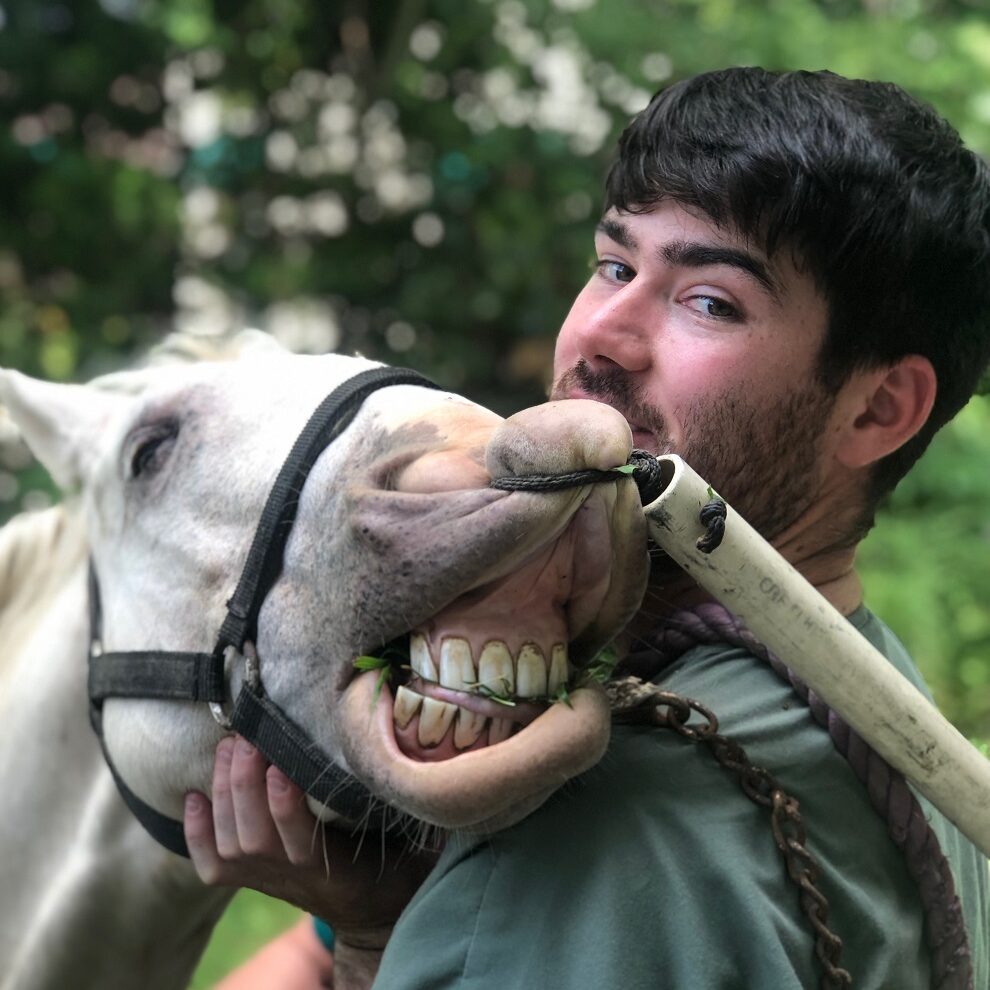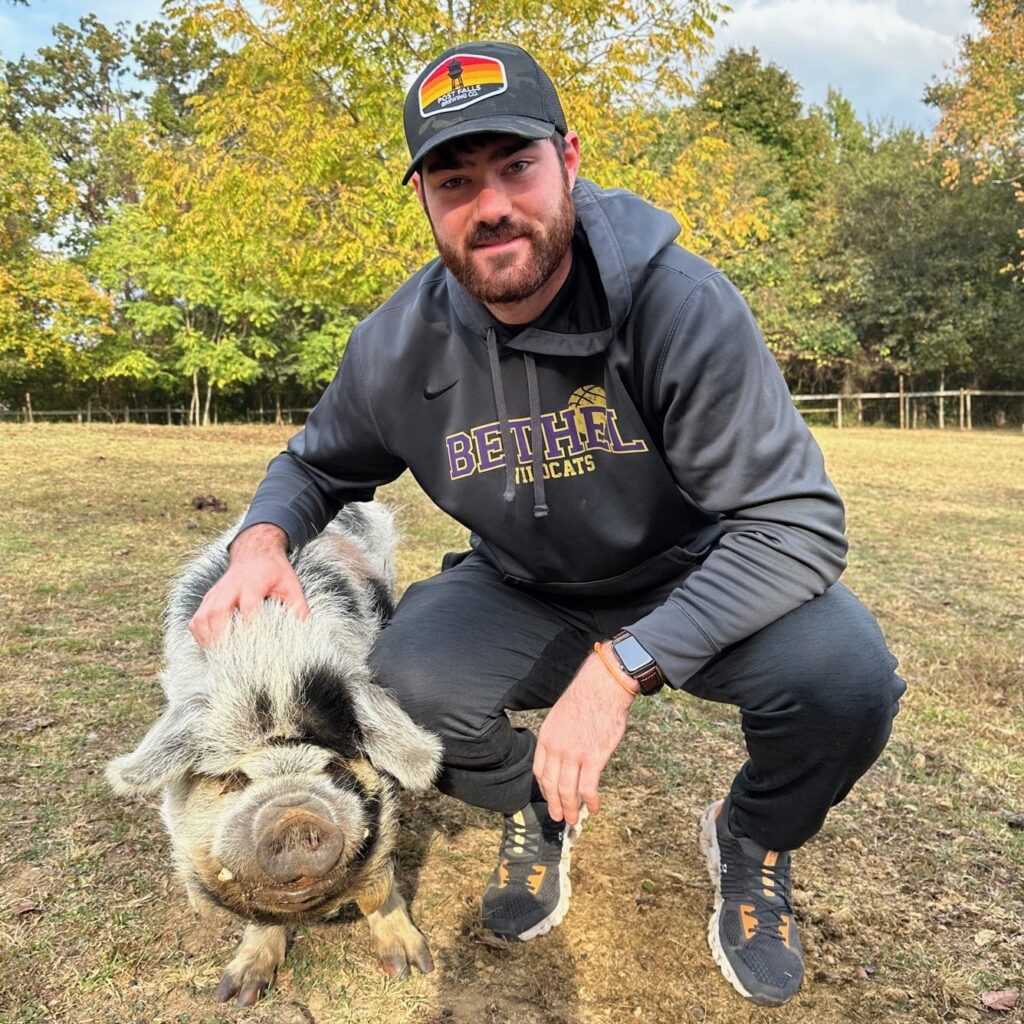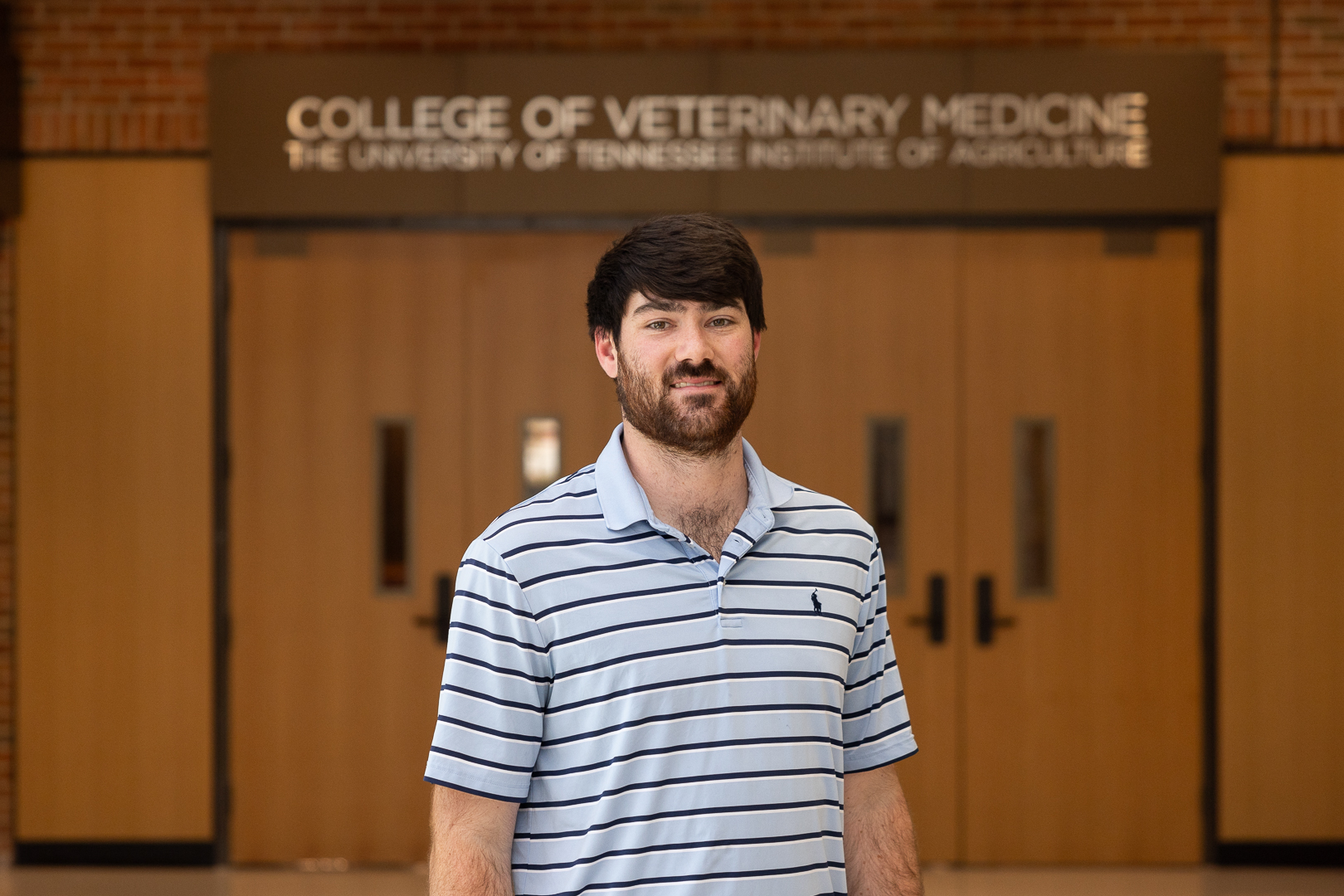
Legacy student and Class of 2026 president embraces transformative education and leadership opportunities at UTCVM
Where are you from, and why did you decide to pursue a Doctor of Veterinary Medicine degree at the UT College of Veterinary Medicine (UTCVM)?
Originally, I am from Paris, Tennessee, where I spent most of my life. However, as a child, I moved around frequently to various locations in West Tennessee, including Clarksville, Ramer, and Selmer. Because of this, I usually just tell people that I’m from West Tennessee. We moved often because my dad, Dr. Michael Boley, a veterinarian and a Tennessee graduate (Class of ’89), had job opportunities in different areas. Over the years, he has owned multiple veterinary practices, which gave me an extensive firsthand view of what the veterinary medical field looks like in real life. I grew up in and out of veterinary clinics and frequently accompanied my dad on farm visits.
Our family has always been devoted Volunteer fans—so much so that my sister was named Manning, after Peyton Manning. I was also fortunate to have been mentored by one of my dad’s classmates, Dr. Kathleen Kunkel, who encouraged me to apply to veterinary school. She played a significant role in my decision to choose the University of Tennessee. I was thrilled to discover that one of the most renowned veterinary schools is located right here in Tennessee, near the beautiful Great Smoky Mountains.
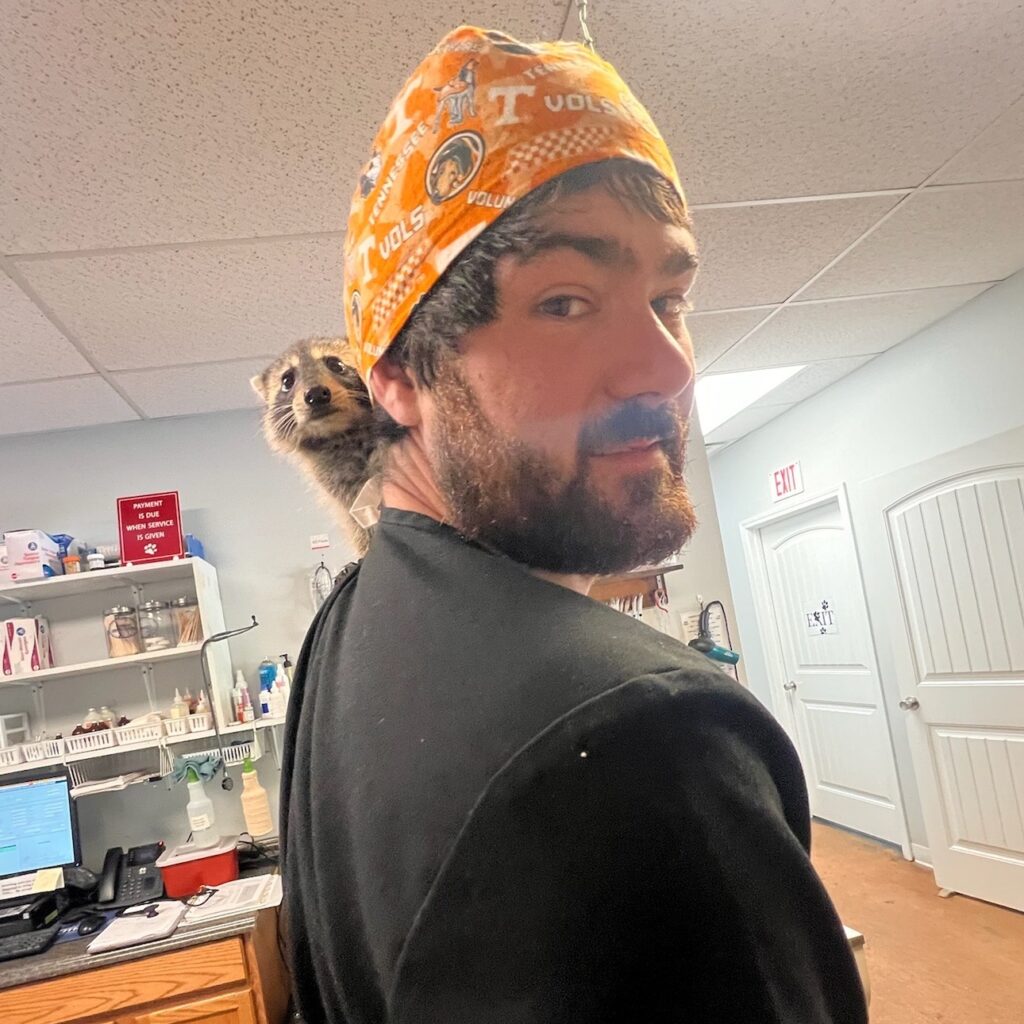
What has been your most memorable experience at UTCVM so far?
This question is very challenging because I have had so many amazing experiences at UTCVM so far. However, if I had to narrow it down to one, my most memorable experience would be the White Coat Ceremony. It was an incredible moment, surrounded by all my friends and family who had watched me work so hard to get to veterinary school. Best of all, we were given the responsibility to invite a veterinary mentor to coat us. It was an unforgettable experience when they called my name, and I walked across the stage, stopping halfway so that my dad, Dr. Michael Boley, could coat me on stage.
The very next year, I was elected president of my class, and I had the honor of giving a speech to the Class of 2027 at their White Coat Ceremony. This added another layer of meaning to the entire journey, as I was able to share my experiences and offer encouragement to the incoming class.
What is your favorite subject to learn about in vet school, and who is a professor who has made a significant impact on your learning experience?
So far, I think the most exciting subject to learn about has been advanced orthopedic surgery. I took this elective lab during the spring semester of my second year, and it was taught by Dr. Daryl Millis. The lab provided a ton of hands-on experience with cadavers, where we learned various orthopedic procedures, tissue handling, splinting, and more. By the end of the course, I felt confident in my ability to attempt various orthopedic procedures.
UTCVM undoubtedly has the best faculty and staff of any university—or anywhere, for that matter. Because of this, it’s very challenging to narrow down a professor who has made the biggest impact on my learning experience so far. However, if I had to choose just one, it would be Dr. Andrea Lear. Her friendly nature makes her one of the most enjoyable people to be around. She’s always happy and constantly cracking jokes, making her truly one of the easiest professors to learn from.
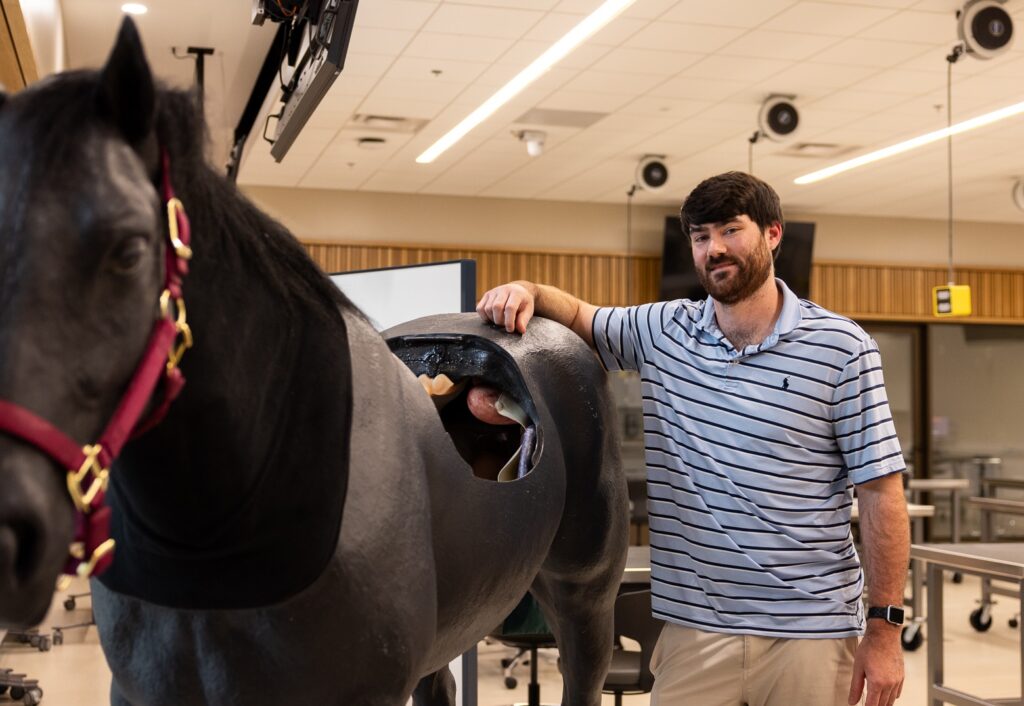
What are some of the challenges and rewards of being a veterinary student at UT?
Veterinary school is no cakewalk. Since starting, my definition of the word “challenging” has been completely altered. It’s hard. There is never really a time when you feel completely stress-free. Monday through Sunday, 7 AM to 12 AM, there’s always more studying to be done, and no amount of preparation ever feels like enough for the next exam. Yet, you have to make time to study, and finding that time is a challenge in itself. But, I am not alone—everyone else in school feels the same way.
Now, for the rewarding part. The people in these classes are all amazing, and I couldn’t ask for a better group to develop strong relationships with as we navigate this journey together. Additionally, it’s incredibly rewarding to see the progress that is made after every semester.
Can you describe any out-of-the-classroom learning opportunities you’ve had during your time as a veterinary student and the impact they had on your education?
I have gained extensive experience through various opportunities outside the classroom. Each summer since starting school, I have returned home during breaks to work alongside my father at his clinic. There, I have been immersed in diverse areas, from understanding the business aspects of veterinary practice to handling emergencies, assisting in surgeries, and strengthening client communication skills.
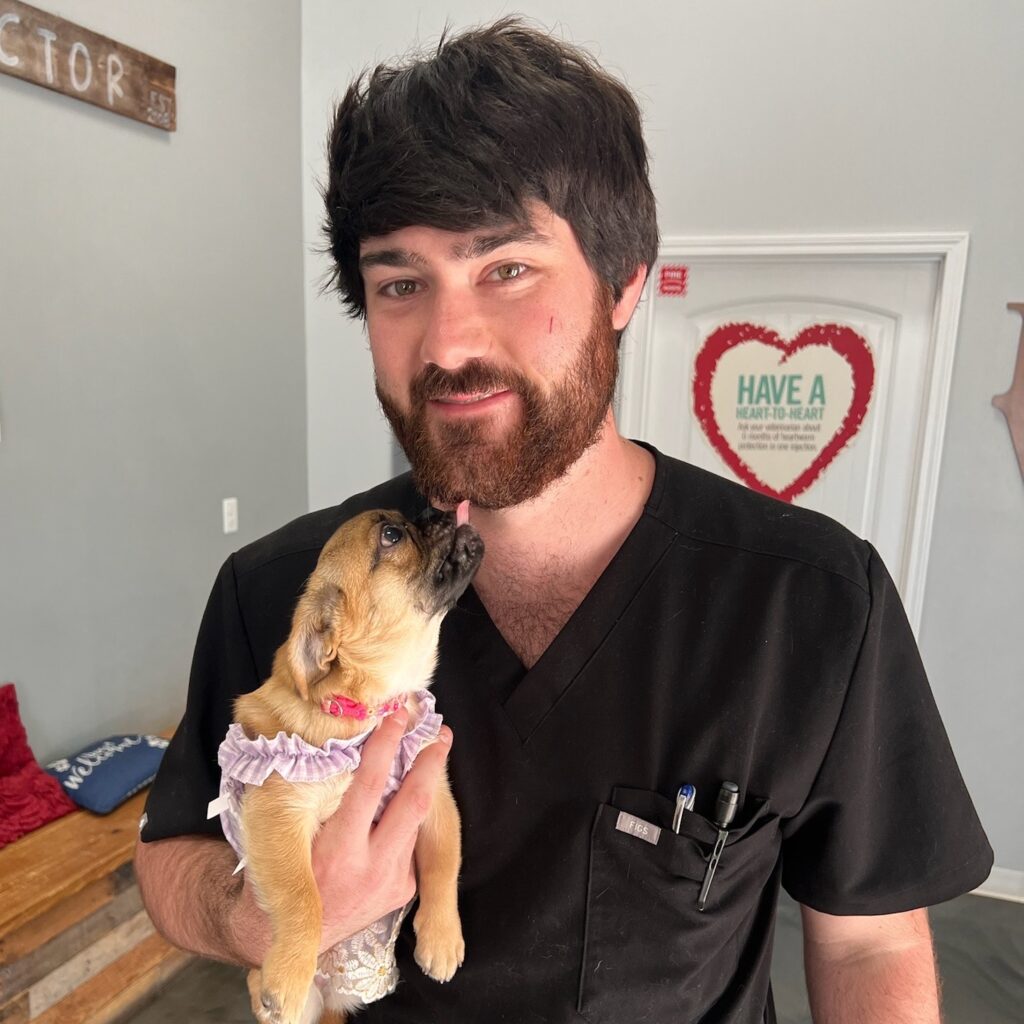
Additionally, I completed a transformative externship at Craig Road Animal Hospital in Las Vegas, Nevada. This experience broadened my perspective on the operations of high-capacity veterinary clinics. The hospital had a large staff, multiple veterinarians, offered both emergency services and appointments, and was equipped with the latest advancements in surgery and medical technology. I also learned valuable business insights and gained hands-on experience in advanced surgical techniques.
Lastly, I had the privilege of attending the Veterinary Leadership Experience (VLE) camp in Idaho. This enriching program brought together veterinarians, specialists, and veterinary students from across North America. It provided an excellent platform for networking and focused on developing leadership and communication skills crucial for success in our field.
How have the leadership roles you’ve held within UTCVM shaped your educational experience and contributed to your development as a future veterinarian?
My leadership experiences have significantly prepared me for a career in veterinary medicine, as they have taught me to balance the demands of academic responsibilities, leadership roles, and personal time. These roles have allowed me to develop resilience in the face of challenges and to lead with adaptability, especially when managing diverse perspectives and problem-solving under pressure.
In addition to enhancing my organizational skills, these experiences have helped me learn the importance of motivating and supporting a team to reach common goals. I’ve gained insights into fostering collaboration, delegating tasks effectively, and making decisions that benefit both the team and the individuals within it. These skills are essential for a veterinarian, as working with a cohesive team is often critical to providing the best possible care for patients.
Furthermore, these leadership opportunities have refined my communication skills, allowing me to engage with clients, team members, and other professionals confidently and empathetically—a vital component of a successful veterinary practice.
What do you see as the future of orthopedic medicine in veterinary care, and how do you hope to contribute to this field?
I believe there will be a higher demand for orthopedic veterinary medicine in the coming years. As the number of veterinarians entering the field grows, we’ll likely see a broader range of services available, including a greater focus on specialized fields like orthopedics. The increasing interest among veterinarians in this specialty reflects an awareness of the demand for advanced orthopedic care for companion animals, especially as pet owners seek out treatments that were once only accessible in human medicine.
Additionally, with the rise of corporate involvement in veterinary practices, training opportunities in specialized areas such as orthopedics are becoming more accessible. Corporations often invest in advanced training and state-of-the-art equipment, making imaging modalities like digital radiography, CT scans, MRIs, and AI interpretation more widely available in veterinary settings. This access to advanced diagnostics is crucial for accurate diagnosis and treatment in orthopedic cases, and I anticipate it will drive further demand for orthopedic services as pet owners recognize the availability of high-quality care.
What advice would you give to veterinary students who are interested in specializing in orthopedic medicine or taking on leadership roles during their studies?
For veterinary students interested in specializing in orthopedic medicine or taking on leadership roles, I would advise focusing on a few key areas that can significantly enhance both your technical skills and your professional development.
First, gaining as much hands-on experience and leadership as possible during school is invaluable. I think that doing so demonstrates your commitment to being actively involved while handling a challenging course load—qualities that are crucial in any specialized field. Pursuing externships, wet labs, or volunteering for surgical opportunities, especially those related to orthopedics, allows you to build both your practical skills and your confidence in clinical settings.
In addition to technical experience, embrace leadership roles. Not only do they provide you with insights into team dynamics and project management, but they also help you develop resilience, problem-solving skills, and adaptability, all of which are critical when dealing with complex orthopedic cases. Leadership roles teach you how to motivate and collaborate with others, skills that will be essential as you work with a diverse team of veterinarians, technicians, and support staff in practice.
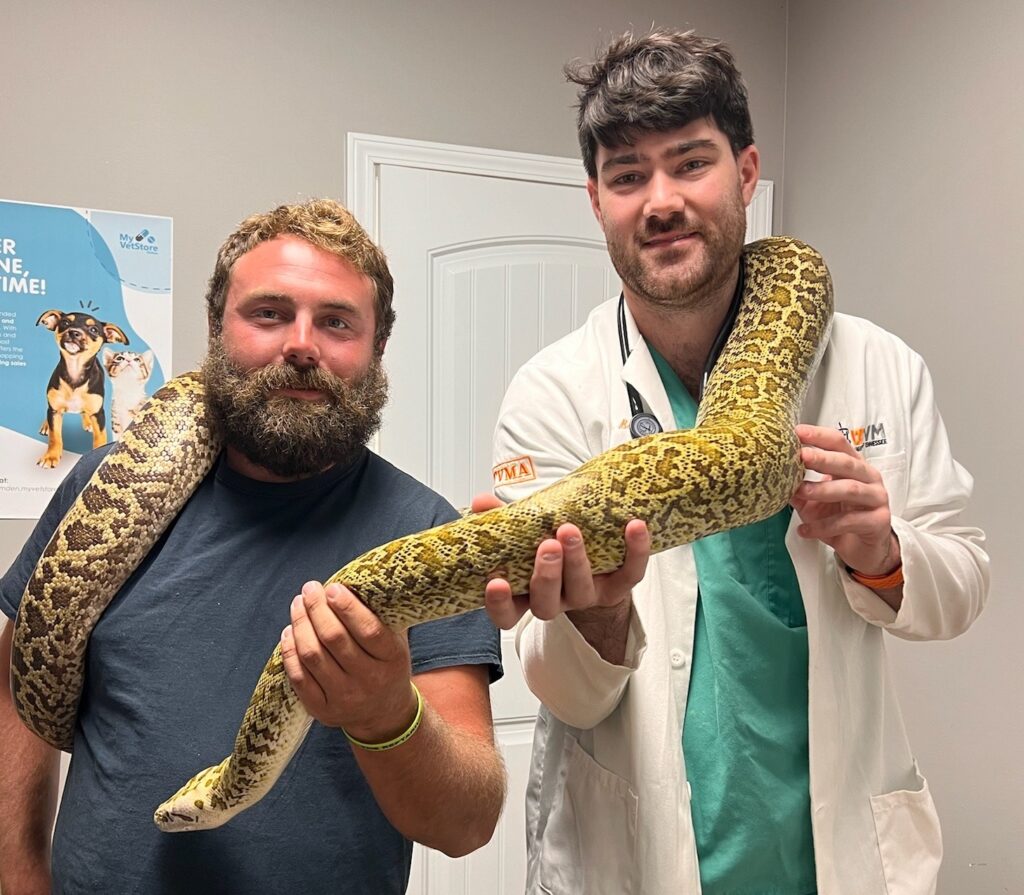
Finally, stay proactive about learning and networking. Take advantage of any orthopedic-focused seminars, workshops, or conferences offered through your school or professional associations. Building connections with mentors in orthopedic medicine and other veterinarians who share your interests can offer guidance, open doors to future opportunities, and keep you informed on advancements in the field.
Looking ahead, what are your career goals after graduation, and how have your experiences at UTCVM prepared you to achieve them?
Looking ahead, my primary career goals after graduation are to continue my education while gaining hands-on experience in a veterinary practice. I’m eager to refine my skills, particularly in advanced procedures, under the guidance of experienced mentors. This combination of ongoing education and practical experience will provide a strong foundation as I work toward my ultimate goal: to join my father in owning a clinic where we can deliver high-quality, compassionate care to our community.
My experiences at UTCVM have thoroughly prepared me to achieve these goals. The clinical rotations, rigorous coursework, and leadership opportunities have given me both the technical skills and the confidence to take on complex cases. Additionally, I’ve gained invaluable insights into the business and operational aspects of veterinary practice, thanks to my father’s mentorship and my work in his clinic. With the training and mentorship I plan to pursue, I’m confident that I’ll be ready to offer advanced veterinary care and eventually lead our own clinic with my father, contributing meaningfully to the field and the community.
What do you like to do outside of school and/or what is a fun fact about yourself that your fellow students and professors may not know?
Outside of school, I love playing basketball—I actually played in college at Bethel University on a scholarship. I also enjoy hiking, playing video games, and spending time with my friends, girlfriend, and family. I’m a huge Houston Rockets fan and never miss a chance to watch their games.
One fun fact that might surprise people is that, when I was younger, I contracted Rocky Mountain spotted fever while exploring in the woods with my dog. The illness led to a severe case of meningitis, and I was hospitalized for over a week. It was a scary experience, but it definitely hasn’t stopped me from being outdoors!
